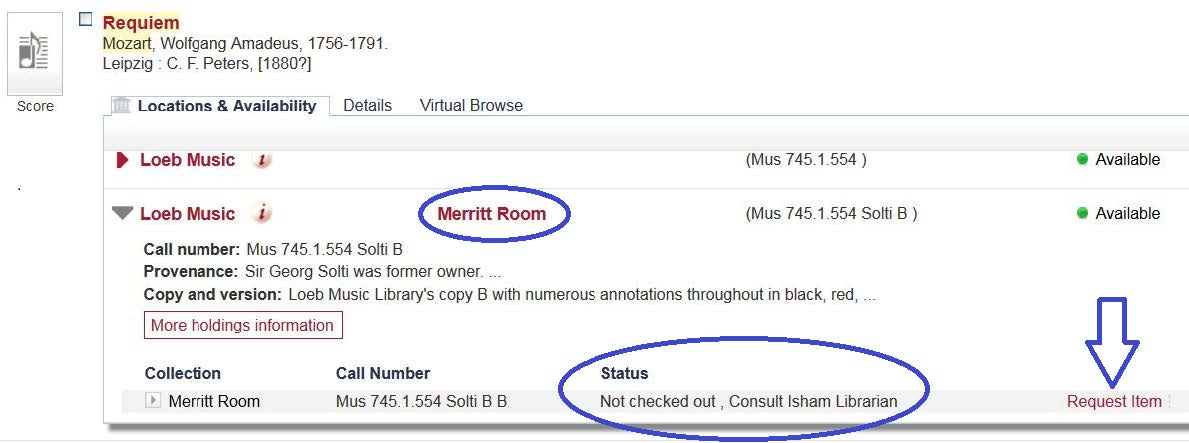Assignment 5: Object Biography
This assignment requires you to write the biography of a musical object. If you've chosen an item from the collections of the Harvard Library, here's what you need to know to make your work easier:
- Sign up for a Special Collections Request Account.
You'll need it to page materials, and it will come in handy for any future research you do using special collections. - Place your requests in advance
Pay attention to the special contact instructions on the assignment for some objects.
Follow the HOLLIS link given in the assignment handout, and click the "request" link on the "Locations and Availability" tab.
Note: The Schlesinger Library uses a different request system: contact them in advance. - Check library hours.
Many special collections are open shorter hours than the main library (and are closed on holidays). In general:- Music Library Special Collections (Isham Library/Merritt Room) open Monday-Friday, 9:00-5:00
- Houghton Reading Room/Harvard Theatre Collection open Monday, Friday, Saturday, 9:00-5:00; Tuesday, Wednesday, Thursday, 9:00-7:00
- Schlesinger Library open Monday-Saturday, 9:00-5:00
- Houghton Library: A Student's Guide: look here up-to-date information on reading room policies, handling tips, photography, and so forth.
- Allow yourself plenty of time with the object; a quick photo or two can jog your memory later, but it won't communicate feel, smell, weight, and so forth.
If you have questions about getting the item you need, or you'd like some advice about finding other primary & secondary sources, email Kerry or drop by the Aldrich Room for help. Have fun!
Assignment 2: Historical Concert Programs
Concert Program Collections
All of these collections include concert programs suitable for your next paper. Especially in larger databases, be creative about your searches: try spelling variations (program vs. programme), add a place or venue, and consider browsing through a page or two of results; you're likely to see patterns in the ways concerts are described that may help you choose an interesting program to research.
If you'd like more advice about using any of the collections, ask Kerry.
-
Eighteenth Century Collections OnlineThis link leads to a pre-formed result set for the subject "Concert Programs"
-
DPLA (Digital Public Library of America): Concert ProgramsThis link leads to a pre-formed result set for the subject "Concert Programs"
-
Google BooksIncludes a large collection of eighteenth and nineteenth century books scanned in libraries worldwide. Although only a limited number of concert programs are available, Google Books is also a valuable resource for primary source material on obscure performers or composers. Once you've entered your search, use the "Search Tools" to limit by time period (and/or to freely-available texts).
-
British NewspapersIncludes the 17th-18th Century Burney Newspaper Collection and the British Library Newspaper Collection. London newspapers such as The Times, The Morning Chronicle, The World, and The Morning Post all contain concert advertisements, and often reviews as well. You can also find a limited number of concert programs for Bath, Dublin, and Edinburgh.
-
19th Century U.S. NewspapersNewspapers from around the United States. Search using the terms “concert program” or “concert advertisement.
Biographical Sources
To find biographical information about composers and performers, try these sites. If a person isn't included in a current reference source, check earlier editions, or ask Kerry for a recommendation.
-
Grove Music OnlineThe main English-language music encylopedia: includes articles on major composers, performers, and conductors.
-
RILM Music EncyclopediasAn international collection of music encyclopedias (1775-present): a good place to look for people who aren't in Grove, or for a different perspective on people who are.
-
Biography and Geneology Master IndexAn index to over 15.4 million biographical sketches: use this as a bibliography to check for titles in HOLLIS+.
-
MusicSackAn index of biographies. Music Sack is a good place to look for obscure names when all else fails.
-
MGG Online: Die Musik in Geschichte und GegenwartThe main German music encyclopedia (if you're using the print edition in the Spalding Room, remember that it's divided into two series: look in "Personentiel" for articles about people).
-
The British Museum Collection OnlineMuseum collections and some curatorial information; useful for examining musical culture through the material record

